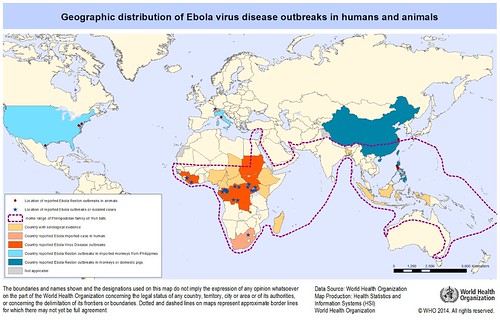What do you need to know about Ebola Posted by Kasia on Oct 29, 2014 in Uncategorized
What is the most popular topic in the international news these days? Most of you will probably agree with me that everyone talks about Ebola and how dangerously fast it is spreading around the world…
The outbreak of the Ebola virus disease (EVD) (wirusowa choroba Ebola) or the Ebola hemorrhagic fever (Ebola HF) – Gorączka krwotoczna Ebola– is becoming an international concern. This fatal and serious disease ( śmiertelna i poważna choroba) has reached Guinea, Liberia as well as eastern Sierra Leone. Recently, it has also starting spreading, and there are seven cases of the disease in Europe, in the UK, Belgium, Germany, France, Spain and the Netherlands; four in the Middle East; and three in the US (Houston, Atlanta and New York). It is said to be one of most infectious diseases in the world today, with a fatality rate of up to 90%. The World Health Organization (WHO) have called the outbreak the worst one in history, with over 1,500 laboratory confirmed cases of Ebola virus this year alone, and 887 deaths resulting from the epidemic.
Ebola is a fast-acting virus (wirus szybko działający), which first reared its head in 1976. The infection is transmitted through direct contact with blood (bezpośredni kontakt z krwią), bodily fluids (płyny ustrojowe/płyny ciała), and tissues of infected animals or people (tkanki zakażonych zwierząt lub ludzi). Ebola is known to cause a violent hemorrhagic fever (gorączka krwotoczna) that leads to external and internal bleeding (krwawienie zewnętrzne i wewnętrzne). Between humans, Ebola is known to spread in the following ways:
· Direct contact through mucus membranes and broken skin with the secretions, blood, organs or other bodily fluids of infected people (Bezpośredni kontakt przez błony śluzowe i uszkodzoną skórę z wydzielin, krwi, organów lub innych płynami ustrojowymi osoby zakażonej)
· Indirect contact with any environment which these fluids have contaminated (Pośredni kontakt z każdym środowiskiem, które te płyny zanieczyściły)
· Exposure to objects such as needles which infected secretions have come in contact with (Narażenie na przedmioty takie jak igły, które miały kontakt z zainfekowanymi wydzielinami)
· Direct contact with an infected corpse (Bezpośredni kontakt z zainfekowanymi zwłokami)
· Semen of men, who have recovered from Ebola are known to be virus transmitters for up to 7 weeks after recovery (Nasienie mężczyzn, którzy wyzdrowieli z Ebola, mogą przenosić wirusy maksymalnie 7 tygodni po odzysku)
· Health care workers who may have been exposed to the virus while treating patients (Pracownicy służby zdrowia, którzy mogą być narażeni na wirusa podczas leczenia pacjentów).
The 2014 West Africa Ebola outbreak, which has been affecting Sierra Leone, Guinea, Nigeria and Liberia, is said to be the largest one till date. The symptoms of the virus is said to be exhibited anywhere from 2 to 21 days from the time of infection.
Symptoms include headache, fever, diarrhea, weakness, muscle and joint ache, loss of appetite, stomach pain, and vomiting (Objawy to bóle głowy, gorączka, biegunka, osłabienie, bóle mięśni i stawów, utrata apetytu, ból brzucha i wymioty).
Some less common symptoms include trouble swallowing, shortness of breath, chest pain, sore throat and hiccups (trudności w połykaniu, duszność, ból w klatce piersiowej, ból gardła i czkawka). Some early symptoms of Ebola also include dengue fever, malaria and other tropical fever, before it progresses to the bleeding phase.
It is still unclear as to how people are actually infected with Ebola. Due to this, no vaccine (szczepionka) has been formulated. Precautionary measures to safeguard oneself from Ebola, if one is traveling to areas where the outbreak is present, are as follows:
· Be sure to practice careful hygiene. If someone is sick with Ebola, avoid contact with any bodily fluids or blood, which may cause infection.
· Avoid touching items that may have come in contact with an infected person’s blood or body fluids.
· Avoid contact with raw or undercooked meat (bushmeat) and wild animals.
· Avoid burial rituals or funerals which require an infected person’s body to be handled.
· Avoid visiting hospitals in the area where Ebola patients are receiving treatment.
· Contact your consulate to provide specific advice on facilities that are suitable for your needs.
· If you develop a fever higher than 101.5°F or 38.6°C or other symptoms such as diarrhea, vomiting, severe headache, stomach pain, muscle pain, unexplained bruising or bleeding, seek medical help immediately.
· Avoid travelling by public transport in areas that have been infected.
· Limit your contact with other people if you travel to a hospital or a doctor.
And….don’t panic!
Do następnego razu… (Till next time…)

Build vocabulary, practice pronunciation, and more with Transparent Language Online. Available anytime, anywhere, on any device.
About the Author: Kasia
My name is Kasia Scontsas. I grew near Lublin, Poland and moved to Warsaw to study International Business. I have passion for languages: any languages! Currently I live in New Hampshire. I enjoy skiing, kayaking, biking and paddle boarding. My husband speaks a little Polish, but our daughters are fluent in it! I wanted to make sure that they can communicate with their Polish relatives in our native language. Teaching them Polish since they were born was the best thing I could have given them! I have been writing about learning Polish language and culture for Transparent Language’s Polish Blog since 2010.





